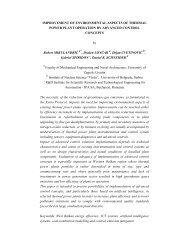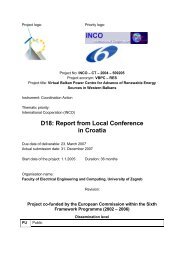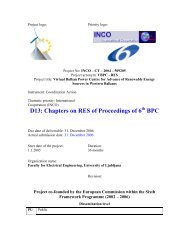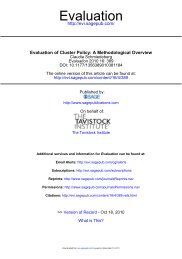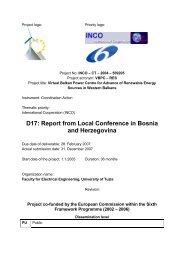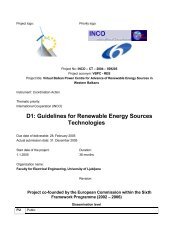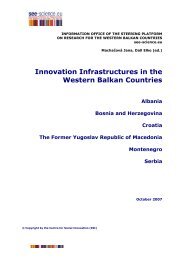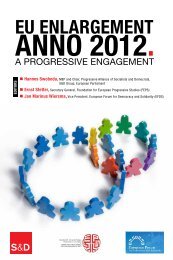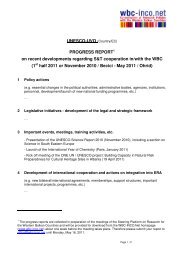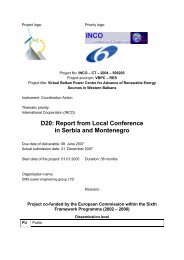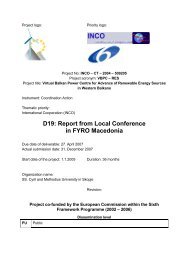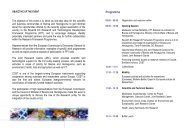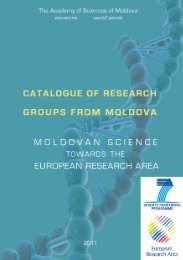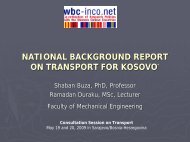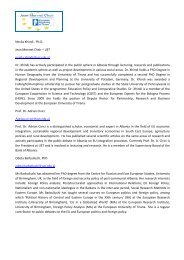Project title (Full title and Acronym) - WBC-INCO Net
Project title (Full title and Acronym) - WBC-INCO Net
Project title (Full title and Acronym) - WBC-INCO Net
You also want an ePaper? Increase the reach of your titles
YUMPU automatically turns print PDFs into web optimized ePapers that Google loves.
Conservation <strong>and</strong> st<strong>and</strong>ardisation of traditional technologies of fermented milk<br />
products based on autochthonous lactic acid bacteria<br />
Potentials for the commercialisation of traditional dairy<br />
technologies <strong>and</strong> autochthonous starter cultures in<br />
<strong>WBC</strong><br />
Natasa Golic, Ph.D.<br />
University of Belgrade<br />
Institute of Molecular Genetics <strong>and</strong> Genetic Engineering<br />
Laboratory for Molecular Genetics of Industrial Microorganisms,<br />
Serbia
Conservation <strong>and</strong> st<strong>and</strong>ardisation of traditional technologies of fermented milk<br />
products based on autochthonous lactic acid bacteria<br />
INTRODUCTION<br />
- Western Balkan Countries (<strong>WBC</strong>) harbours a variety<br />
of traditional, spontaneously fermented foods<br />
manufactured in small scale at specific ecologica l<br />
localities<br />
- Artisanal products harbour a rich diversity of yeasts,<br />
LAB <strong>and</strong> acetic acid bacteria<br />
- The market share of the traditional fermented foods in<br />
Europe is growing as consumers have an increasing<br />
awareness for artisan h<strong>and</strong>ling, gastronomic quality, <strong>and</strong><br />
healthy food status.<br />
- The tightened (European) legislation on food safety<br />
(HACCP rules) resulted in the disappearance of number<br />
of regional artisanal fermented products.
Conservation <strong>and</strong> st<strong>and</strong>ardisation of traditional technologies of fermented milk<br />
products based on autochthonous lactic acid bacteria<br />
Laboratory for Molecular Genetics of Industrial<br />
Microorganisms (LMGIM)<br />
Institute of Molecular Genetics <strong>and</strong> Genetic Engineering,<br />
(IMGGE)<br />
University of Belgrade<br />
LMGIM collection include over 4000 LAB isolates from various<br />
spontaneously fermented foods<br />
Cheese<br />
Yogurt<br />
Kajmak<br />
Meat products<br />
LAB of human origin<br />
The expansion of the existing collection of natural LAB strains<br />
Selection of new, potential probiotic strains
Conservation <strong>and</strong> st<strong>and</strong>ardisation of traditional technologies of fermented milk<br />
products based on autochthonous lactic acid bacteria<br />
SCIENTIFIC OBJECTIVE<br />
Isolation <strong>and</strong> characterisation of lactic acid bacteria<br />
<strong>and</strong> yeasts from artisanal dairy products manufactured at<br />
different geographical regions in Western Balkan.<br />
Designation of functional starter cultures based on<br />
selected autochthonous LAB <strong>and</strong> yeast strains for production<br />
of cheeses with geographical origin.
Conservation <strong>and</strong> st<strong>and</strong>ardisation of traditional technologies of fermented milk<br />
products based on autochthonous lactic acid bacteria<br />
Partners:<br />
WG1:. University of Belgrade, Institute of Molecular Genetics <strong>and</strong> Genetic<br />
Engineering (IMGGE), Laboratory for Molecular Genetics of Industrial<br />
Microorganisms (LMGIM), Belgrade, Serbia<br />
Prof. Ljubiša Topisirović, PhD, Nataša Golić, PhD – Secretary of PSALAB<br />
Coordinator of PSALAB <strong>Project</strong> <strong>Project</strong> Milan Kojić, PhD -<br />
Amarela Terzić-Vidojević, PhD Ivana Strahinić, PhD<br />
Jelena Begović, PhD Jelena Lozo, PhD<br />
Branko Jovčić, PhD Sanja Mihajlović, PhD<br />
Katarina Veljović, PhD<br />
Maja Tolinački, MSci<br />
Milica Nikolić, Msci Jovanka Lukić, PhD student<br />
Brankica Filipić, PhD student<br />
Goran Vukotić, PhD student<br />
Gordana Uzelac, PhD student<br />
Head of LMGIM
Conservation <strong>and</strong> st<strong>and</strong>ardisation of traditional technologies of fermented milk<br />
products based on autochthonous lactic acid bacteria<br />
WG2: University of Zagreb, Faculty of Food Technology <strong>and</strong> Biotechnology<br />
(FFTB), Laboratory for Antibiotic, Enzyme, Probiotic <strong>and</strong> Starter Culture<br />
Technology, Zagreb, Croatia<br />
Prof. Jagoda Šušković, PhD<br />
Blaženka Kos, PhD<br />
Jasna Beganović, PhD<br />
Andreja Leboš Pavunc, BSc<br />
Ksenija Uroić,<br />
BSc<br />
WG3: University of Ljubljana, Biotechnical Faculty (UL-BF), Department of Food<br />
Science <strong>and</strong> Technology, Ljubljana, Slovenia<br />
Prof. Peter Raspor, PhD<br />
Neža Čadež, PhD<br />
Golob, BSc<br />
Hana Šuranska, BSc<br />
Petra Doušova, BSc<br />
WG4: Probiotik d.o.o., Zagreb, Croatia (SME)<br />
Prof. Ljerka Gregurek, PhD<br />
Željka Krušev Šurić,BSc Katarina<br />
Gregor
2<br />
3<br />
3 1 2<br />
Conservation <strong>and</strong> st<strong>and</strong>ardisation of traditional technologies of fermented milk<br />
products based on autochthonous lactic acid bacteria<br />
Serbia<br />
1<br />
Croatia<br />
Collection of cheese samples<br />
18 cheese samples (1–10 days old) collected from:<br />
- 3 Serbian localities (South Morava region, Mountain Golija<br />
<strong>and</strong> Eastern Serbia mountain region)<br />
- 3 Croatian localities (Prigorje, Bilogorsko-Podravska region<br />
<strong>and</strong> Zagorje)
Conservation <strong>and</strong> st<strong>and</strong>ardisation of traditional technologies of fermented milk<br />
products based on autochthonous lactic acid bacteria<br />
Enumeration <strong>and</strong> isolation of LAB <strong>and</strong> yeast strains<br />
from cheese samples<br />
- A total of 828 LAB <strong>and</strong> 433 yeast strains were isolated from 18<br />
cheese samples<br />
- 88 LAB isolates were determined by 16S rDNA sequencing<br />
- 69 yeast isolates were determined by ITS DNA region sequencing
Conservation <strong>and</strong> st<strong>and</strong>ardisation of traditional technologies of fermented milk<br />
products based on autochthonous lactic acid bacteria<br />
LAB <strong>and</strong> yeast diversity
Conservation <strong>and</strong> st<strong>and</strong>ardisation of traditional technologies of fermented milk<br />
products based on autochthonous lactic acid bacteria<br />
Characterization of LAB <strong>and</strong> yeast isolates
Conservation <strong>and</strong> st<strong>and</strong>ardisation of traditional technologies of fermented milk<br />
products based on autochthonous lactic acid bacteria<br />
Probiotic properties of LAB <strong>and</strong> yeast isolates
Conservation <strong>and</strong> st<strong>and</strong>ardisation of traditional technologies of fermented milk<br />
products based on autochthonous lactic acid bacteria<br />
•<br />
•<br />
88<br />
69<br />
Culture collection management<br />
strains of LAB were deposited in ZIM<br />
strains of yeasts were deposited in ZIM<br />
Preservation methods for microorganisms.
Conservation <strong>and</strong> st<strong>and</strong>ardisation of traditional technologies of fermented milk<br />
products based on autochthonous lactic acid bacteria<br />
Starter culture preparation<br />
- Nine LAB isolates selected for the sensor evaluation;<br />
- Eight combinations of starter cultures were designed
Conservation <strong>and</strong> st<strong>and</strong>ardisation of traditional technologies of fermented milk<br />
products based on autochthonous lactic acid bacteria<br />
Production of white brined cheese with selected LAB<br />
isolates
Conservation <strong>and</strong> st<strong>and</strong>ardisation of traditional technologies of fermented milk<br />
products based on autochthonous lactic acid bacteria<br />
Production of fresh soft cheese with selected LAB isolates
Conservation <strong>and</strong> st<strong>and</strong>ardisation of traditional technologies of fermented milk<br />
products based on autochthonous lactic acid bacteria<br />
Future prospective<br />
The results of the project provided:<br />
An inventory of Serbian <strong>and</strong> Croatian traditionall y<br />
manufactured white-pickled <strong>and</strong> fresh soft cheeses <strong>and</strong> their<br />
microbial diversity;<br />
A well characterized bacterial culture collection that can<br />
serve as a source of bacteria for the construction of starter<br />
cultures with well-defined functional properties;<br />
Production of white-pickled <strong>and</strong> fresh soft cheeses with<br />
autochthonous LAB as functional starter cultures could<br />
attract SMEs interested in production of innovative dairy food<br />
products.
Conservation <strong>and</strong> st<strong>and</strong>ardisation of traditional technologies of fermented milk<br />
products based on autochthonous lactic acid bacteria<br />
Commercialization of autochthonous starter cultures<br />
Experience<br />
- Previous attempts to implement autochthonous starter<br />
cultures into industrial sector in Serbia - experimental stage.<br />
- Five innovation projects financed by Ministry of Education,<br />
Science <strong>and</strong> Technological Development, Republic of Serbia<br />
- Pilot cheese production in dairy plants in Sremska Mitrovica,<br />
Zrenjanin, Subotica, Bac, Zlatar, Kopaonik<br />
Problems<br />
- Aggressive market strategies of larger companies for<br />
production of commercial starter cultures<br />
- Lack of governmental support for the implementation of<br />
autochthonous starter cultures
Conservation <strong>and</strong> st<strong>and</strong>ardisation of traditional technologies of fermented milk<br />
products based on autochthonous lactic acid bacteria<br />
Commercialization of autochthonous starter cultures<br />
Possibilities<br />
- Dissemination of knowledge by internet site <strong>and</strong> flyers<br />
distributed at conferences <strong>and</strong> other relevant events.<br />
Opportunities<br />
- Increasing number of small dairy companies interested in<br />
using autochthonous starter cultures; “Ivancic <strong>and</strong> sons”clinical<br />
trials<br />
- Breaking down barriers to get in touch with producers<br />
(SMEs) of artisan food products, will allow stimulation of<br />
their innovation drive.<br />
-<strong>Full</strong> knowledge of the microbial diversity of traditional<br />
fermented food products would make SMEs eventually<br />
stronger on the EU market.
Conservation <strong>and</strong> st<strong>and</strong>ardisation of traditional technologies of fermented milk<br />
products based on autochthonous lactic acid bacteria<br />
CONCLUSIONS<br />
The results obtained in this study indicates that the<br />
cheese samples traditionally manufactured in different<br />
regions in Serbia <strong>and</strong> Croatia seem to be diverse in the<br />
LAB <strong>and</strong> yeast composition.<br />
These results have important impact on designation of<br />
starter cultures for dairy products with geographical<br />
origin.<br />
Knowledge gained during this project would be<br />
essential for the food industry in order to start marketing<br />
the food with specially defined functional properties .



